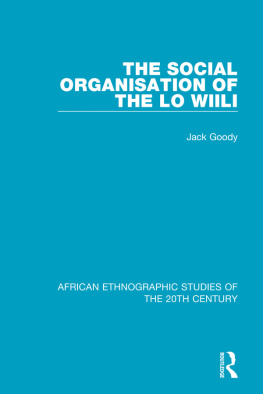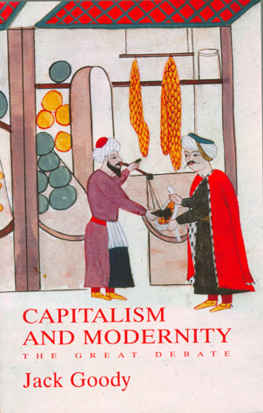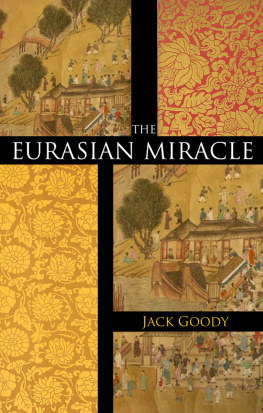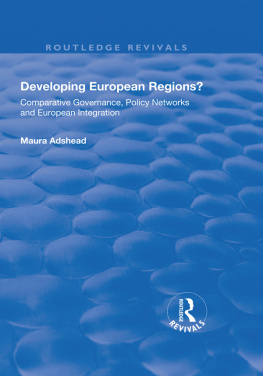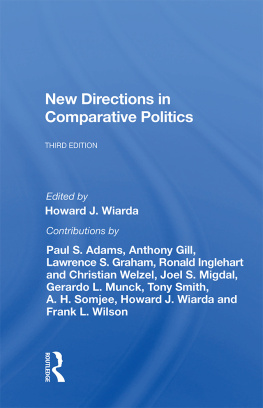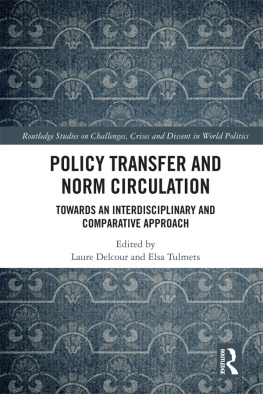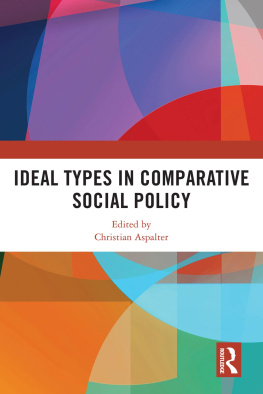First published in 1969
Reprinted in 2004 by
Routledge
2 Park Square, Milton Park, Abingdon, Oxon, OX14 4RN
Transferred to Digital Printing 2006
Routledge is an imprint of the Taylor & Francis Group
1969 J Goody
All rights reserved. No part of this book may be reprinted or reproduced or utilized in any form or by any electronic, mechanical, or other means, now known or hereafter invented, including photocopying and recording, or in any information storage or retrieval system, without permission in writing from the publishers.
The publishers have made every effort to contact authors/copyright holders of the works reprinted in Routledge Library Editions Anthropology and Ethnography. This has not been possible in every case, however, and we would welcome correspondence from those individuals/companies we have been unable to trace.
These reprints are taken from original copies of each book. In many cases the condition of these originals is not perfect. The publisher has gone to great lengths to ensure the quality of these reprints, but wishes to point out that certain characteristics of the original copies will, of necessity, be apparent in reprints thereof.
British Library Cataloguing in Publication Data
A CIP catalogue record for this book is available from the British Library
Comparative Studies in Kinship
ISBN 978-0-415-33010-7
ISBN 978-1-136-53556-7 (ePub)
Miniset: Family & Kinship
Series: Routledge Library Editions Anthropology and Ethnography
Printed and bound by CPI Antony Rowe, Eastbourne
Comparative Studies
in Kinship
JACK GOODY
LONDON
ROUTLEDGE & KEGAN PAUL
First published in 1969
by Routledge and Kegan Paul Ltd
Broadway House, 6874 Carter Lane
London, E.C.4
J. Goody 1969
No part of this book may be reproduced
in any form without permission from
the publisher, except for the quotation
of brief passages in criticism
SBN 7100 6390 3
THE major problems that face the comparative study of human society, especially as concern simpler societies, are two-fold. The first has to do with the reliability of its observations. Accounts of overt ritual activities present relatively few difficulties; some aspects of social life, such as divorce, residence and similar features are being subjected to crude numerical treatment. It is rather in the spheres of norms and concepts where fieldworkers often seem to lose sight of the criteria of evidence, of the differences between assertion and demonstration, or indeed of any idea that replicability (or the possibility of replicability) is a desirable goal. Moves in the right direction are being made by certain American fieldworkers but meanwhile one should recognize that the standards of anthropological observation, the levels of cultural scholarship, are often remarkably low. This situation needs remedying at once and advances can be made only when we abandon (or at least reduce) our commitment to wholistic studies. To think that anyone can cover a culture, even a pre-literate, homogeneous one, in a year or two is a figment of the anthropologists imagination and not one that he would be prepared to extend to an understanding of his own personal situation. It has been possible in the past only because of the great paucity of written knowledge about pre-literate and partly literate peoples.
Secondly, social anthropology (which Radcliffe-Brown referred to as comparative sociology) needs to progress from its phase ofdescriptive analysis and get into the business of comparing, not social systems or societies or cultures as such, but specified variables under different social conditions. This is our experimental method, crude as it may be. It doesnt replace intensive investigation but it is a necessary adjunct to the undirected collection of diffuse data that is often described as fieldwork. Indeed even intensive fieldwork of the Trobriand or Tallensi kind is full of implicit comparisons, if only because of the language in which the societies are described.
The solution to both these problems presents a major challenge to social anthropology, since it questions the concentration on (though not the utility of) intensive fieldwork and the adequacy of anthropological methods. My own view is that rather than be tied to a single approach, one needs to use the best available techniques to answer ones questions and solve ones problems, and these methods should not be too readily defined in disciplinary terms. Inevitably new approaches will develop in the course of asking more pointed questions than the usual catch-all village study. At the moment nothing marks the anthropological method more than the lack of it. For example, one has only to compare recent Anglo-French discussions of systems of thought to see that something is wrong at the ground level; the methods of documentation clearly leave so much to be desired that serious discussion is often little better than speculation, pseudo-anthropology.
The problem also presents a major challenge to the social sciences as a whole. The present division of these subjects is a reflection of a time when Western Europe and America dominated the world scene, economically, culturally, intellectually. That time is past. We cannot afford a sociology that concentrates upon Euro-American societies in the hope that all others will industrialize and turn out much the same. As fieldworkers we cannot afford an anthropology that dwells exclusively on the tribal world. We must create the conditions for the emergence of a truly comparative sociology.
In the early days of European sociology the subject was essentially comparative; the works of Montesquieu, Comte and Spencer deal with the whole range of human societies. On the anthropological side writers like Tylor and Frazer leant heavily towards the simpler cultures and to the survivals of these that they perceived in other places. The wider comparative perspective was retained by legal writers like Maine and Vinogradoff, a man who spoke of his work in jurisprudence as comparative sociology.
In this century, the two great sociological thinkers, Emile Durkheim and Max Weber, have continued to work on a wide canvas of this kind, attempting both to formulate and test their theories by means of the comparative method.
It is a strange contrast to recall the kind of opprobrium that has been showered on comparative research in the last few decades, and even now occasionally emerges from the pen of distinguished social scientists. The professional dichotomy had much to do with the kind of colonial situation that America faced; sociology was for the immigrants, anthropology for the natives. The sort of radical division of the realm of human behaviour that resulted seems less profitable, less suggestive, than it did; certainly the fields of sociology and anthropology are becoming increasingly interlinked; as the simpler cultures become more complex, the division seems less and less relevant; and as techniques diffuse between disciplines, the anthropological approach gets increasingly difficult to differentiate from the sociological. So that the chances for the development of a truly comparative sociology become somewhat more rosy.



